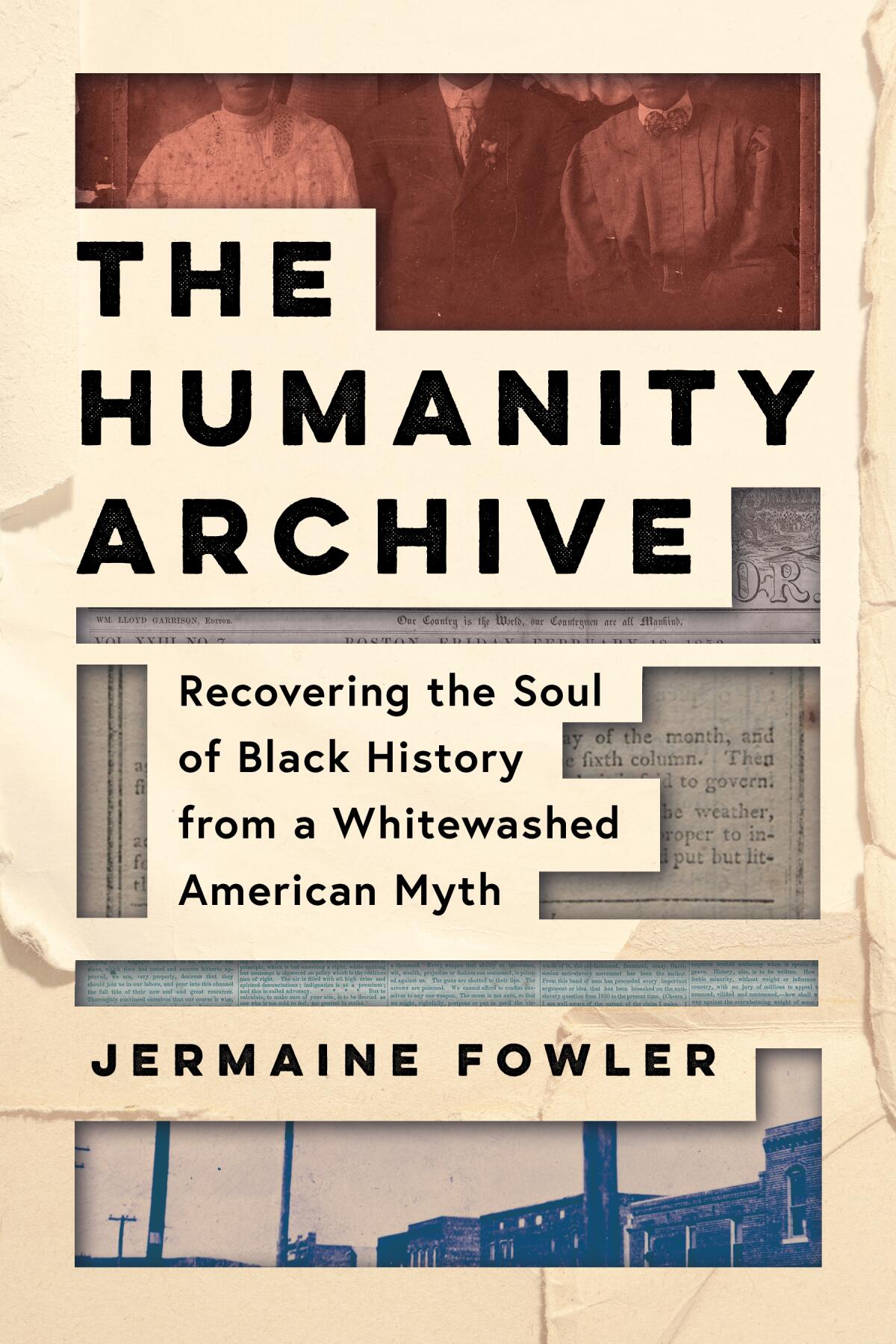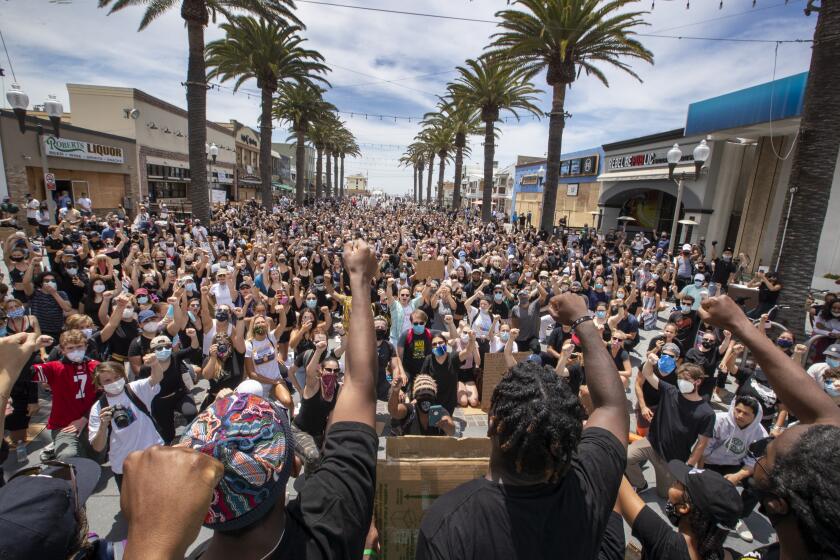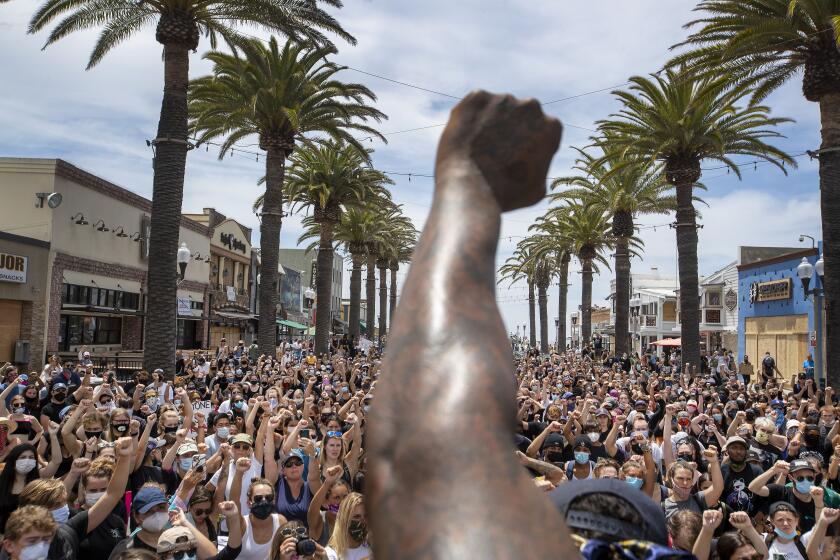For the soul of Black history, a podcaster-author looked past the same old stories

- Share via
On the Shelf
The Humanity Archive: Recovering the Soul of Black History from a Whitewashed American Myth
By Jermaine Fowler
Row House: 416 pages, $29
If you buy books linked on our site, The Times may earn a commission from Bookshop.org, whose fees support independent bookstores.
When asked to draw a clock, people with brain damage who suffer from right-side spatial neglect often crowd the numbers and hands on the right side but leave the left side empty. They think the picture is complete, unaware of their blind spot. You could argue that Europeans and white Americans have been afflicted with the same half-blindness when it comes to recounting history, mistaking a fraction of humankind’s accomplishments and tragedies for the whole story.
In “The Humanity Archive: Recovering the Soul of Black History from a Whitewashed American Myth,” Jermaine Fowler attempts to fill in the rest. Fowler, 39, isn’t a formally trained historian but a podcaster embarking on a sort of people’s history. While “The Humanity Archive” began as a podcast, it’s really a love letter to books and a childhood spent at the library learning about the wider world that wasn’t taught in schools.
His new compendium of overlooked history bypasses the most famous stories (especially from the civil rights movement) to cover the unheralded achievements of Africans as well as Black Americans, as well as their mistreatment at the hands of Europeans and then white supremacists here. Fowler spoke recently via video from his home in Louisville, Ky. This interview has been edited for length and clarity.
Even as a backlash brews over teaching America’s racist history, ‘Forget the Alamo’ and ‘How the Word Is Passed’ tell of the full, inglorious past,
Your book is being marketed toward Black History Month, even though you argue that Black history must be taught year-round instead of given this “cursory scribble.”
The book comes out on the 28th, the end of Black History Month, so I look at it as a jumping-off point, to show that Black history does not have an expiration date and can go beyond February, with the book as the beginning of your journey.
Some on the right, of course, think too much Black history is already being taught.
There needs to be more uproar from people who don’t want to see books banned and do want this history taught. The other side’s voices are being heard more loudly. I’m trying to be a voice saying, “We need more access to every book that kids want to read so they can become critical thinkers as they learn this history.”
Who is your imagined reader for this book?
I wrote this book as a Black man in America — a book that a young Jermaine would have wanted to read. So in that sense I’m writing for Black readers. But I always hope to touch on broader themes of humanity and reach other people as well.

You write that when you were younger, you “dove headfirst into Afrocentrism,” but then realized you’d gone too deep. Where’s the balance?
To me that speaks to the point of fighting the monster but not becoming the monster. Eurocentrism reduces all things African to their worst qualities. That was the narrative until the late 1960s. I do think that counternarrative needs to be there. We shouldn’t get rid of Afrocentrism because a lot of great Black history has been discovered and come out of that. However, for me personally, it almost was like becoming the monster — I was reducing Europe and saying, “Forget everything European.”
You celebrate the 14th century Mali ruler Mansa Musa, yet criticize his focus on wealth and empire as no different from white rulers. When you recall learning the true depths of Rosa Parks’ activism, you discuss the sexism within the civil rights movement. Does it feel dangerous to be self-critical throughout?
It feels dangerous because we’ve had that turned on us so much throughout time. But for honesty, to tell about all sides of Black humanity, I have to do that. I had to look at what power looked like when the oppressed gained power, like in Liberia. I’m not afraid to turn the critical lens inward. It’s the only way to grow as humans.
Professor Marcus Anthony Hunter, who was UCLA’s first chair of African American studies, on why the College Board’s deletions are devastating.
Black history is gaining more attention with books about, for instance, the Tulsa massacre and the slave ship Clotilda, but books like yours and Clint Smith’s “How the Word Is Passed” take a broader approach. What do you think your book adds to the conversation?
I want to connect the underlying themes. An individual story might miss the bigger picture of what Black humanity looks like. Those stories usually connect the Black experience to the pain and the trauma, but what about everything else?
Your book covers so much — figures from 1,000 years ago in Africa to the 20th century U.S., topics from ancient metallurgy to contemporary art — that the sprawl can become overwhelming. Do you worry about certain topics getting lost in the shuffle?
The details are trying to connect to the bigger themes.
I wanted to make sure I was telling overlooked stories — that’s why I didn’t have a chapter on the civil rights movement — and I want people to say, “Wow,” and then dig deeper on their own. That’s why I’ll write, “I read this book,” and mention the Black scholars who wrote about it in depth. My book is broad brushstrokes and I want you to go get more details. It’s a challenge to the reader.
Covering so many topics must make it a challenge to have the right details and perspectives. For instance, you write about Mallie Robinson moving from Georgia to Pasadena a century ago and still facing segregated housing and swimming pools. But moving to California allowed for Robinson’s son Jackie to play on integrated teams; when Branch Rickey was choosing a candidate to break baseball’s color barrier, Robinson had the experience because California was integrated.
That story was more about his mother and what she faced in California. But the book is my personal journey through history. I’m no expert, I’m just somebody surrounded by books who loves to read. I did do scholarly research, but I’m doing what I’m hoping other people will do, which is jump into the mess of history and try to find your way out of it.
Walter Mosley, Luis Rodriguez, the coiner of #BlackLivesMatter and others sketch a hopeful future for L.A. and the U.S. after George Floyd protests.
Did dwelling in the past, the horrors and the accomplishments, leave you optimistic or skeptical about America’s future?
The people I wrote about were resilient and brilliant enough to make it through, and we can do the same thing and make this experiment with democracy work. There’s a spectrum with everything from Afro-pessimism to “The Black future is in joy.” I’m somewhere in the middle. The truth deals in equal terms with hope and despair.
More to Read
Sign up for our Book Club newsletter
Get the latest news, events and more from the Los Angeles Times Book Club, and help us get L.A. reading and talking.
You may occasionally receive promotional content from the Los Angeles Times.









